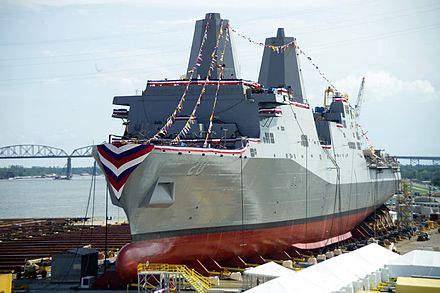
https://en.wikipedia.org/wiki/Avondale_Shipyard
Ports should coordinate. So says Conrad Appel, former head of the Port of New Orleans Board
As a past member and chair of the Port of New Orleans Dock Board, I read with great interest — and dismay — recent reports that the Port of South Louisiana plans to spend $445 million to buy the old Avondale site. I believe this is a seriously bad idea, but it presents an opportunity to rethink how we manage Louisiana’s ports. The former Avondale site is located within the jurisdiction of the Port of New Orleans, which raises significant legal questions about the planned acquisition. On a positive note, it reopens a decades-long discussion that should resume: Why do we have five port authorities competing for resources and business on the lower Mississippi River — and more than 30 port authorities statewide? The Port Authority of New York and New Jersey crosses state lines and oversees one of the world’s busiest ports with coordinated air, rail, sea and land connections. Why can’t Louisiana have just one port authority that coordinates policies, logistics and strategies within our state based on single master plan? That’s a long-range solution, but we must begin that process in earnest.
nola.com
Studies do not back up buying the yard.
Of more immediate concern, the Port of New Orleans has done a number of economic and engineering studies of the Avondale site. The conclusions of those studies never varied: the site is functionally obsolete, and redeveloping it is not economically feasible. The obsolescence of Avondale derives from many factors: rail and highway access; a pier that is too narrow; the Huey P. Long Bridge, which is too low for modern ships to clear; the site remains heavily polluted; and on and on. The economic shortcomings of Avondale are grounded in the bedrock principle that cost and efficiency are the only factors that determine the viability of a port complex. The Lower Mississippi is littered with once viable, now abandoned port facilities. The costs of bringing ships farther upriver (pilotage fees, for one), the inability to handle large quantities of containers, the decline in the use of breakbulk cargo shipping, the lack of rail on dock facilities, the unattractiveness of the Mississippi River for liner services, competition with East Coast ports that are closer to population centers and other factors all contribute to Avondale’s economic shortcomings.
Prior efforts have failed why will this one do better?
Two irrefutable facts prove my points. First, the seller, T. Parker Host, tried for several years to make the site work. Despite its own expertise and international network — and $150 million invested in the site — Host couldn’t attract tenants to Avondale. Host encountered the same issues that the Port of New Orleans’ studies revealed, namely that Avondale is an obsolete facility that cannot meet modern demands. Second, the Port of New Orleans and state economic development leaders recognize the future lies not in an upriver, traditional facility built to yesterday’s standards, but in a large, modern container terminal in St. Bernard Parish. The St. Bernard site offers all the benefits Avondale lacks: lower costs to shippers; more efficiency; modern port management; easy access to rail lines and more.
Back to the major point.
Which brings me back to my larger point. For generations, Louisiana’s port authorities have too often competed rather than coordinated with one another. While most of them traditionally dealt with different cargo and customer mixes, they undercut each other when they compete for the same cargoes — and as a result they all suffer, along with area businesses that benefit from port activities. We must also remember that port facilities are extremely expensive. As long as politics, rather than economics, drives major economic development decisions, poorly directed spending will pull us all down. Imagine for a moment how a half billion-dollar or more investment in a port complex that has no contracted business and has shown no potential under private management will turn out. The notion that “if we build it, they will come” only works in movies, not in real life. We cannot afford to waste more time and money chasing an impossible dream. Sadly, that has been the Louisiana way for too long. The state should invest its resources in a terminal designed to succeed, not one destined to fail. We must seize the moment by looking forward, not backward — and begin taking steps to put all Louisiana ports under one umbrella authority.
This is not something we care about but it impacts the area. The City, thus our taxes, will get involved.

